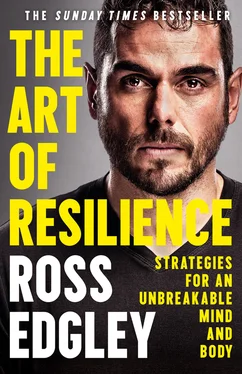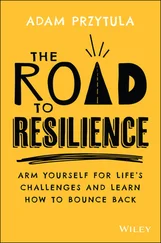Entering the officer’s mess (an area where military personnel socialise and eat) I sat down with my good friend Ollie Mason, a Royal Marine Captain, head rugby coach and my temporary training instructor, to reflect on the last few days. Perched on a couple of grand leather sofas, we drank tea and spent the first few moments in silence.
Looking around it always felt like such a privilege for me just to be here. Hundreds of officers would have passed through these doors over the years. Yet this place still possessed a kind of timeless, old-fashioned opulence and came complete with solid-oak bookcases, polished brass door frames, a grand piano in the corner and a huge painting depicting a group of commandos receiving their green berets and becoming fully-fledged Royal Marines.
The silence was broken as we were joined by one of the older officers.
‘You boy,’ he said pointing at my shrivelled feet and hands. ‘I heard about your 48-hour training swim. What is it that you are training for?’
He was tall with massive hands that made the teacup he was drinking from look comically puny. He also had an equally impressive moustache. You couldn’t have designed a better Royal Marine Officer if you’d tried.
‘I’m possibly training for the world’s longest current-neutral swim,’ I said.
He paused and sipped his tea, looking pensively into the bottom of the cup as if searching for clues before giving his verdict.
‘Can I be honest with you, young man?’ he asked.
‘Yes, please do,’ I replied, intrigued as to what he could possibly say.
‘That just sounds a bit shit.’
Needless to say, I wasn’t expecting this response. Nor did I actually ask for a response. In fact, I was still yet to introduce myself and learn his name. But it seemed the usual pleasantries had been forgotten and we’d gone straight into an impromptu brainstorming session.
Ollie then intervened. ‘I’m going to be honest, mate. I think you should just man up and swim around Great Britain.’
‘Why would I do that?’ I asked stunned at the scale of his proposed swim.
‘Well, I can think of at least three reasons,’ he said. ‘It’s about 1,800 miles so would be the longest staged sea swim in human history. You’d be bringing that record back home to British waters. And it doesn’t sound as shit as a current-neutral swim in Bermuda.
I paused to consider his logic.
At first, I dismissed the idea. Sipping my cup of tea in a semi-conscious and heavily-chlorinated state, I laughed, shook my head and shuddered at the thought of spending my summer ploughing through some of the most treacherous currents in the world up and down the coast of Britain.
But as the night wore on, and the tea supply ran low, I have to admit it no longer seemed like the worst proposition in the world. Maybe I wasn’t thinking straight due to sleep deprivation, but as I sat there comatose in my giant leather chair the thought of swimming around this big rock we call Great Britain continued to play on repeat in my head. I began to think about the Great British adventurers of old, from Captain James Cook to Ernest Shackleton; it seems adventure and exploration are engrained in our British DNA, and the idea of following in their footsteps (in my own smaller way) had now lit a fire under my belly that even an energy-sapping 48-hour, 185-km training swim couldn’t extinguish.
~
It’s 7.00 p.m. on 3 August 2018 and we’re 63 days (and over 800 miles) into the Great British Swim. We’ve reached the Gulf of Corryvreckan, a narrow strait between the islands of Jura and Scarba off the west coast of mainland Scotland. There is no doubt this is the wild, wild west of Great Britain. In the summer, the towering mountains plunge into the glens below among scattered collections of pine trees. But in the winter, those same mountain ridges become shrouded in white as Arctic blizzards leave a crystalline layer of shimmering snow on their peaks.
At the moment, we are somewhere between summer and autumn. Mile after mile of gnarled, wet heathland across the firths and fells is turning a golden brown in the ever-weakening sun. All of which you can enjoy as an incredible and unique spectacle if wrapped in a thick coat, woollen hat and warm thermal gloves.
None of which you can enjoy if you find yourself submerged in 8°C seawater, midway through an attempt to become the first person to swim around Great Britain, the ninth-largest island in the world.
Which is exactly where I currently find myself. Some 856 miles into what will be known as the Great British Swim. Far from happy and far from healthy.
After swimming through treacherous storms, pounding waves, constantly changing tides and polluted shipping lanes, my lungs and limbs no longer function like they used to and have been plagued by fatigue for twelve hours a day for the past two months straight. But this was a fatigue unlike any I’d experienced before …
Exhaustion was essentially deep-rooted within my ligaments and tendons. What’s more, my tongue was shedding layers from chronic salt water exposure as I gasped for air with every stroke. (This was a condition known as ‘salt tongue’ where all moisture from the mouth is lost and the first few layers of your tongue begin to erode away.) To top it all off, the Scottish waters were showing no mercy as the very tides themselves felt angry and venomous.
As for my other body parts, my shoulders had been relentlessly contorted by the waves for so long, while my skin had been tormented by chafing, sea ulcers and the bitter cold. In fact it was so rough, discoloured and a strange blend of blue, purple and grey that I no longer looked like I belonged to this world. Finally, my nose and cheeks had swollen so much from the constant battering of the waves that I struggled to fit my goggles over my increasingly painful eye sockets.
But despite my long list of ailments I did consider myself lucky to still be on the surface of the water (rather than below it). The local coastguard had told us that the waters are so treacherous and the death toll so high, its place is forever cemented in Scottish folklore. Local fishermen speak of a mythological Hag Goddess who governs the lochs and pools of Scotland.
I must point out that, before arriving at the Corryvreckan I would not have considered myself very superstitious, but that would quickly come to change. As the howling winds funnelled through the islands, the haunting sound which seemed to echo across the coast led me to believe that something in Scottish mythology was insulted that I would even attempt this.
The wildlife of Scotland seemed to agree too. Gathering to enjoy the spectacle, birds began to circle overhead and a lone seal watched from afar – none of them were quite sure what they were witnessing. That’s because my shoulders had been relentlessly contorted by the waves for so long, my swim stroke was dogged and cumbersome and I didn’t look like most humans they’d seen before.
Keeping a safe distance from this half-man half-beast, the crew on our support boat, the Hecate , decided it was time to prepare me for more torture ahead. Matt (the captain of the Great British Swim) and Taz (Matt’s son and chief crew) shouted clear and precise instructions from aboard the deck.
‘You’re going to have to sprint at full pace for the next three hours,’ Matt said with a hint of empathy, knowing he was asking a lot from my bruised and battered body. ‘If you do that, we’ll be clear of the whirlpool.’
Given the current state of my body, a three-hour sprint was ambitious. Unfortunately, I knew he was right; this was the only way to swim through this seething stretch of water known as the Corryvreckan whirlpool. At this moment in time, pacing strategies, rest and recovery simply didn’t exist. You either swam hard or you didn’t swim at all.
Читать дальше












